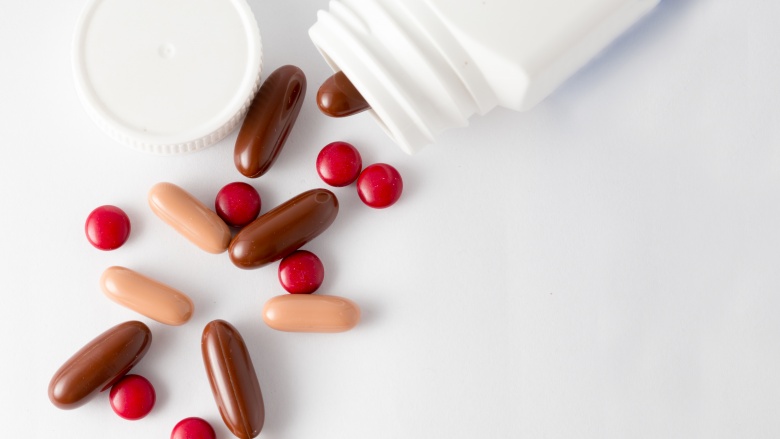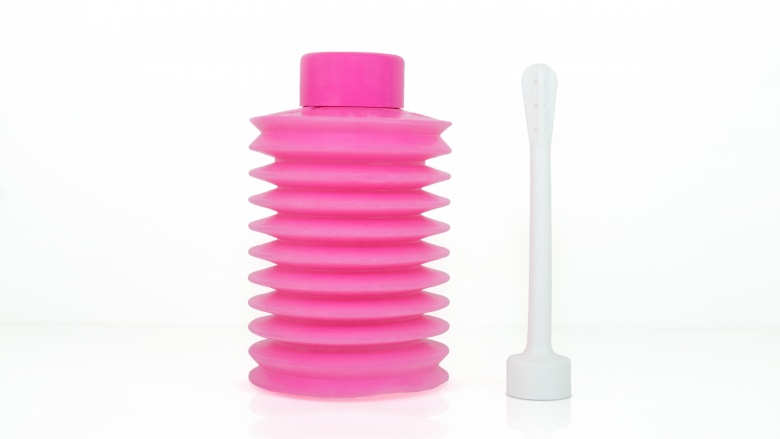How To Get Rid Of Gross Body Odors
We've all been there — you've been there, I've been there... heck, Jennifer Aniston and Emma Watson have probably both been there, too (probably).
Gross body odors are a natural part of life and having — you know — a body. And while we, unfortunately, can't eradicate them forever, there are ways to combat the fumes that cause nasal assault against the people around you. Check out some ways to get rid of gross body odors — some of these tactics might surprise you!
Bathing — the first defense against stink... but do it the right way
What's better than a nice, hot shower after a long day? Well, the fact that you end up being squeaky clean, for one.
Don't get it twisted, however — doctors are now saying that showering in itself might not be enough, even if you're using anti-bacterial soap to combat your more private zones that naturally emit more sweat and oils, and thusly, a more potent you-bouquet.
Medical studies to that effect have demonstrated that simple soap — AKA non-anti-bacterial; sorry, Lush, still love you! — isn't cutting the mustard. In a 2001 study, the Centers for Disease Control (CDC) claimed that your favorite lavender-smelling soap isn't cutting the mustard — or the smell-causing and sickness-inducing bacteria. Instead, it disrupts your skin's natural balance, and can sometimes even spread bacteria to the soap, your washcloth, or your shower. Cringing yet?
The CDC continued, "Bathing or showering cleans the skin by mechanical removal of bacteria shed on corneocytes [a part of your outermost skin]. Bacterial counts are at least as high or higher after bathing or showering with a regular [non-antibacterial] soap than before. Frequent bathing has...little microbiologic purpose. Mild, non-antimicrobial soap should suffice for routine bathing, [however], bathing with an antimicrobial product reduces rates of... infection."
Gross.
Deodorant!
Deodorants and anti-perspirants are great for keeping odors away, but beware of what you're using.
Long have people wondered if the aluminum in mainstream anti-perspirants and deodorants include cancer-causing agents, but The National Cancer Institute says that more research is needed to effectively make a firm determination. The FDA echoes the National Cancer Institute's sentiments about aluminum- and paraben-inclusive applications, and said, "[The] FDA believes that at the present time there is no reason for consumers to be concerned about the use of cosmetics containing parabens. However, the agency will continue to evaluate new data in this area. If FDA determines that a health hazard exists, the agency will advise the industry and the public."
Dr. Philip W. Harvey, contributor to the Journal of Applied Toxicology, said via an interview with WebMD that the absence of evidence does not necessarily indicate much. "Absence of evidence is not evidence of absence of a harmful effect," Harvey said. "These chemicals are being directly applied daily, by very large numbers of people, and the long-term health effects of exposure are essentially unknown."
Be careful what you're using under there. Just in case.
Change your diet, girl
According to an article by Berkeley Wellness, an online resource for evidence-based wellness information produced in collaboration with the University of California, Berkeley, School of Public Health, certain foods can trigger body odors — specifically garlic, curry, and onions. If you can't live your life without the perfect Thai or Indian food, no sweat (pun totally intended), just balance out your diets with these stink-busting foods.
Herbs like parsley, spearmint, and peppermint can combat odors. Dr. Sally Cram, a spokeswoman for the American Dental Association, told Woman's Day, "These herbs can act like a mouthwash to temporarily mask odors. Plus, they leave behind a pleasant aroma." In that same article, David Colbert, MD, author of "The High School Reunion Diet," claims that citrus fruits can help combat body odor. "The acids in citrus fruits help flush water through your body. And because citrus also contains fiber, they move through your system slowly and flush out toxins that contribute to body odors." Other foods to avoid if you're of the stinky persuasion — it's okay, we've all been there — include going meatless, avoiding sulfur-infused foods like cauliflower, alcohol (no!), and certain types of fish.
Beware of quick fixes
Look, nobody's slamming anybody's great, money-making idea, but any supplement claiming to be a quick fix warrants skepticism. Body Mint, which is a supplement that's not FDA-approved or regulated, is a derivative of chlorophyll. And studies have shown that too much of a good thing — like chlorophyll — isn't great news for your body. A study by Oregon State University says that chlorophyll in itself has long been used as an "internal deodorant." They even report that there are vegetables high in chlorophyll like spinach, parsley, and cress topping the list.
However, Livestrong makes a good point — as chlorophyll is derived from green plants, the risks include not overdosing on "too much" chlorophyll, but ingesting or topically applying a liquid derivative of something that was possibly subjected to inorganic elements during its growth or extraction processes. Livestrong wrote, "The plants used to make liquid chlorophyll could provide potential exposure to heavy metals, pesticides and other environmental toxins from the water or soil."
"Pesticides can interrupt hormone function, damage the nervous system or cause cancer," the site continued. "Contamination with heavy metals such as mercury can cause damage to the nervous system." Don't take dietary supplements looking for a quick fix, because that doesn't really exist — change your diet instead.
Botox?
We're not big fans of plastic surgery, let alone face-freezing treatments, but Botox has been proven to help combat pesky underarm odors.
Reportedly, Botox injections are said to diminish sweat glands on in your armpits. According to Botox, the simple procedure can cure — or reduce — sweat odor for months at a time, but come with the same sets of possible side effects of regular Botox injections, such as itching, rash, red itchy welts, wheezing, asthma symptoms, or dizziness or feeling faint. Other reactions can include dry mouth, discomfort or pain at the injection site, tiredness, headache, neck pain, and eye problems: double vision, blurred vision, decreased eyesight, drooping eyelids, swelling of your eyelids, and dry eyes.
We'll take the grapefruit instead, thanks.
Improve your lifestyle choices
Drinking water and avoiding all tobacco products can certainly help in the BO department. Water has long been proven to be the elixir that flushes all toxins — including stench-inducing toxins — from your body. It also keeps you hydrated, and obviously, less "potent" when you sweat.
The CDC recommends drinking clean water for a variety of purposes including regulating your temperature — which will cut down on smelly perspiration — lubrication of your joints, protects internal and external tissue, and rids your body of wastes through "urination, perspiration, and bowel movements."
As for the tobacco, that goes without saying. You've stood or sat next to smokers or those who chew tobacco, right? That's a heck of a smell in itself. Enough said.
Back away from the douches
While the title could be taken in a variety of ways — especially when it comes to relationships — we're not talking about it in that sense today. But the sentiment is the same in both cases: stay away from them.
Doctors say that douching for any reason, but especially to achieve the effect of a better "natural" smell — is one of the worst things you can do to your vagina. According to Michael Castleman, M.A., douching is a terrible thing. In Psychology Today, he wrote, "The vagina contains many different bacteria that live in complex relationships with each other. Within 10 minutes of douching, some get killed, which upsets the ecological balance. The vagina reverts to normal within 72 hours. But before it does, bacteria no longer held in check by those that have been eliminated may multiply and cause a variety of ills."
The "ills" in question refer to a higher risk of contracting chlamydia, pelvic inflammatory disease, bacterial vaginosis — which increases unpleasant smell — trichomoniasis, yeast infection, cervical cancer, infertility, and ectopic pregnancy.
According to the publication, Dr. David Eschenbach — Professor of Gynecology at the University of Washington — says, "The vagina is a self-cleansing organ. With regular bathing, douching is completely unnecessary." Just make sure you're using the right soap.
Be good to your vagina, and she'll be good to you — don't douche, okay? For everyone's sake.







